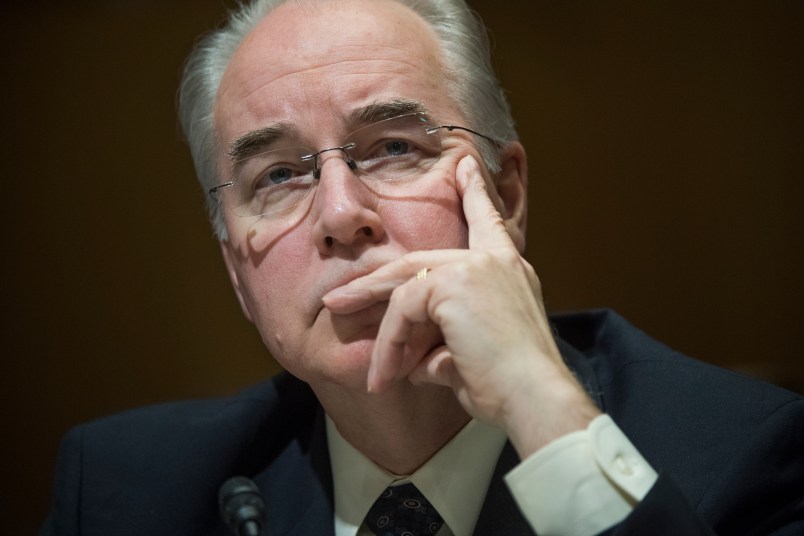A top insurer group, as well as outside health care policy experts, are saying that a Trump administration statement signaling that crucial subsidies to insurers will continue as a House GOP lawsuit targeting the payments proceeds does not go far enough to bring certainty to insurers as they price their plans for 2018.
In a statement to the New York Times Monday, the Department of Health and Human Services said that “while the lawsuit is being litigated, the cost-sharing subsidies will be funded.” The statement was the first official sign from the Trump administration about its current policy but one that fell short of answering the longterm questions about the subsidies, known as cost sharing reduction (CSR) payments.
“Plans need more certainty,” Kristine Grow, the spokeswoman for America’s Health Insurance Plans, told TPM Tuesday in an email. “As plans make decisions for 2018, they do so with a view of wanting to serve consumers in the market for the full year. That’s why it’s so important to know what will happen with CSRs long term.”
The subsidies reimburse insurers for keeping out-of-pocket costs down for low income consumers, as mandated by the Affordable Care Act. House Republicans sued President Obama’s administration over the payments in late 2014, arguing that they were illegal because they had not been appropriated by Congress. The lawsuit was considered by many to be a long shot until a federal judge last May sided with with the House GOP. She paused her ruling from taking effect while the Department of Justice, under President Obama, appealed the decision.
The case is now on hold until May, as requested by the Trump administration and the House GOP. A major question is whether the Trump administration will reverse the federal government’s position in defense of the payments, and withdraw or settle its appeal. If the subsidies were to end – be it by voluntary action by the HHS or a defeat in the lawsuit – the individual market would succumb to chaos, if not a full a collapse.
It’s anticipated that insurers would hike premiums to make up for the shortfall or pull out from the individual market entirely.
Another option for securing the subsidies in the long-term would be for Congress to appropriate them or set up some other permanent funding mechanism. Key Republicans in the ongoing health care fight on Capitol Hill have said they favor maintaining the subsidies. But the top GOP appropriators overseeing the HHS in both the House and the Senate have also said they are not planning to carve out the funding in their appropriations this year.
“We’ve been told not to worry about it, it’s going to get fixed,” Rep. Tom Cole (R-OK) – who chairs the appropriations subcommittee on Labor, Health and Human Services, and Education – said, according to Politico.
Monday’s statement from the HHS comes after a Politico report last week that said their was an internal White House debate over keeping the funding. The Steve Bannon wing of President Trump’s inner circle has lobbied to stop the payments immediately, according to Politico, while Ivanka Trump, Jared Kushner and chief economic adviser Gary Cohn favor keeping them for now.
The next deadline for the lawsuit is in May, when House Republicans and the Trump administration are expected to reveal their next steps. Many insurers will need to submit their plans for 2018 by June.











So here’s my guess: Price refuses to clarify, and the administration asks for another delay in the case. Insurance companies submit pricing plans based on the assumption that the payments won’t be continued because prudence. Then the administration turns around and says that the ACA is imploding and that the price increases mean the insurance companies no longer need the subsidies.
And people in red states get hit hardest, except for all the ones who already had no coverage because they’ve been falling between the unexpanded medicaid limit and the exchange lower bound.
Tierney Sneed is the best. I see a Pulitzer in her future. Hope TPM can keep her. The Washington Post probably wants her.
Price: I’m a little busy dealing with insider trading and abuse of office allegations. Could you come back later?
And the MSM will fail to make the cause and effect connection between the GOP sabotage of both the risk corridors (Rubio) and the cost sharing subsidies (GOP lawsuit) and the insurers leaving the ACA thereby implicitly endorsing the GOP position about the failure of the ACA.
Perfect. This is more of the continuing BS that is the Trump Administration. "Don’t worry. We won’t screw you.’ and then further down the road ‘OF COURSE, we’re gonna screw you. You need to take 1/10th on the dollar for have the great good luck of serving our lame-ass health program!’…I’m sure happy and reassured that we are running the country JUST LIKE a corporation!